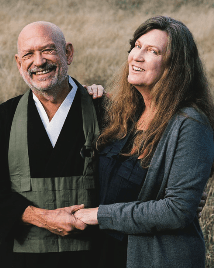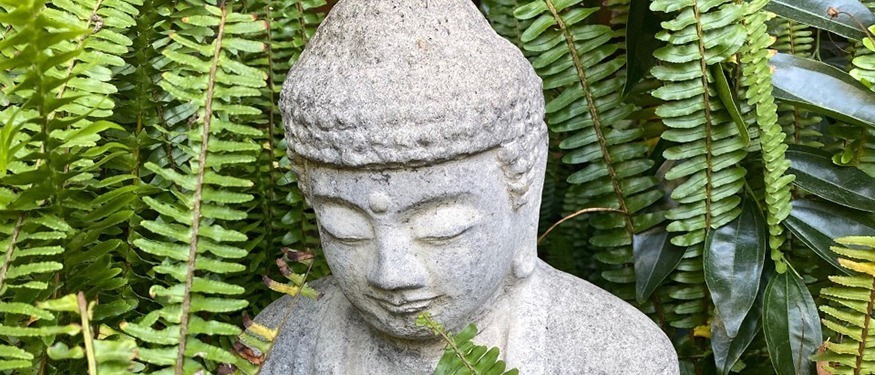
After the Fall
April 1, 2021

Peter with his wife Shirley
by Eihei Nanfu Peter Levitt
My wife Shirley and I live on an island off the coast of the larger Vancouver Island in British Columbia. It’s where we raised our son, Tai. As if being surrounded by water on this island is not enough, our home in the woods is also situated on a lake. And because we live in this part of the world, there is often a good deal of rain to nourish the forest that surrounds our home and make everything green. Often people remark that the air here feels unusually soft and moist, and that the leaves and needles on the pine and maple, alder and cedar that we consider our neighbours are so vividly green. “It’s just so benevolent and nourishing,” some have said, “as if every breath is an entire meal!”
For us, Spanish poet Federico Garcia Lorca expressed the feeling this soft, moist world provides when he wrote, Verde, que te quiero verde: Green, how I love you green. We feel so fortunate to live where we live and call it home.
But we have all lived long enough to know that a seeming paradise is never that alone; the trees are tall, at times the shadows they cast can be dark and long.
One recent January afternoon, I was walking on our deck with an aluminum ladder in my hand. I was going to do a quick climb to see if the roof repair I had made against the coming rain had held. As I walked, I noticed that parts of the northern side of the cedar deck where I was walking had grown a pervasive, almost unseen web of slippery moss, so I had to walk with great attention and care in order not to fall. But it turns out that noting something and doing it are not the same thing—in this case getting my thought all the way down to my feet—and suddenly I was flying through the air, heading for the glass wind screen that surrounds the deck, the ladder in my hand threatening to trap me against the glass; that is, if it didn’t push me through entirely.

With great good fortune, the ladder went flying in another direction, and instead of striking the glass, my body struck one of the wooden support posts just beside it, but it struck it with such force that I was knocked back toward the house in a rebound and landed on my back. Then I felt my head hit the deck with a sharp blow. This all must have happened in a matter of three seconds or less, and I was stunned. I could feel pain immediately in my back and shoulder and neck, and my head felt cracked.
After a few seconds, I realized the shock to my body and mind was severe, but I was able to ask myself, “Do I have a concussion?” Lying there supine, determined not to move, I tried to answer the question by looking up at the sky. It was a beautiful pale blue, with wisps of white clouds floating through, and, most importantly, I could see it clearly. My eyes were focusing as they should. “Okay,” I heard myself say out loud. That’s when I heard my breathing, which was rapid, and my heart beat, which was racing far too fast, pounding against my ribs. “I could have a heart attack,” I thought, and in the next moment, “Do zazen!” And, so, I did, lying there on my back, the dampness of the cold deck starting to moisten my shirt and skin.
It was a curious kind of instantaneous lying-on-a-wet- deck zazen. After the first few breaths, I began to hear myself say on every inhale, “I’m so lucky! I’m so lucky!” and then I’d breathe out, releasing the shock into the air. I was saying this in my mind, of course, but after a minute of zazen I started to hear the words out loud, “So lucky! So so lucky!” and I noticed my breathing had already started to slow down.
That’s when I heard something else. Someone was chanting. Underneath “I’m so lucky,” something or someone had laid down a track of the Enmei Jukku Kannon Gyo as we sing it in our sangha, the Salt Spring Zen Circle. Our manner of chanting Kanzeon Na Mu Butsu, Yo Butsu Un In, Yo Butsu U En is somewhat different from the way most Zen sanghas chant because it has a melody I created for the chant when my children were young to help calm them and surround them with Kanzeon as they snuggled up in bed, moving softly, slowly, into the world of their dreams. And so it is more sung than chanted. This is what I was hearing.
“It’s just so benevolent and nourishing,” some have said, “as if every breath is an entire meal!”
It really was so strange, because as I focused my mind, still aware that my body was hurting, the chant/song seemed to come closer and closer to me, as if someone was walking out of the forest to help me, while singing the chant into the air. That’s the sense I had as the seconds passed; with each repetition, the melodious chant was becoming a bit louder and more easily heard.
And then, slowly, I realized that it was me; I was the one chanting. Or rather, I was the one being chanted because, of course, there was no benevolent witness to my fall coming out of the forest; the chant was going on entirely in my heart, my mind. I hadn’t decided to chant; not in the same way I had made the decision to do zazen to calm my heart and breathing. No. Chanting had just spontaneously begun, all on its own. In response to the shock of my fall; from somewhere deep inside, there was chanting.
As I listened, I felt the chant wrap itself all through and around me, and with a smile at how odd the mind can sometimes be, I also found myself recalling the famous dialogue about Avalokitesvara where Yunyan asks Daowu:
“What does the bodhisattva of compassion do with so many hands and eyes?” to which Daowu replies:
“It’s like someone reaching back for their pillow at night.”
So, Yunyan tells him, with some excitement, “I got it! I got it!”
And Daowu inquires, probing his response: “What did you get?”
“All over the body are hands and eyes,” says Yunyan. “How about you, elder brother?”
And Daowu tells him:
“Wherever the body reaches are hands and eyes.”
Yes. “Wherever the body reaches,” the hands and eyes of the bodhisattva of compassion will be found. Sometimes they reach to help, bringing comfort, or food, or support of another kind, in a way that is as natural as someone reaching back for their pillow in the middle of the night, or as the life of the planet, like the green air that rises out of the forest where our family makes our home. And sometimes the bodhisattva’s reach will be found in a voice.
“It’s like someone reaching back for their pillow at night.”
The hands and eyes of Avalokitesvara, of Kanzeon, were chanting, and as they did, I began to feel a sense of ease that had not been there before. “Wherever the body reaches…” Daowu had said. That wherever was just right there.
I closed my eyes and lay in the chant, feeling profound gratitude for my good fortune not to have gone through the glass, not to have been knocked unconscious, but to have ended up with the gift of this chant. And, as the chant went on—for I lay there a good five minutes or more until I felt ready to try to move—I remembered Dogen’s fascicle Continuous Practice in his Shobo Genzo. Yes.
But it’s important to say that it was not just my practice that I was aware of, not at all, because I can’t say with any certainty that the chant really began only after I went down. When I think about it, isn’t it possible that the chant is always going on, just as the wherever of the body reaching, and the so many hands and eyes are without beginning or end in the boundless and continuous practice of what we call “this world”? And that circumstances were just lined up so that in those particular moments following my fall, the sweet Ten Phrase Avalokitesvara Chant for Prolonging Life that invokes Kanzeon in us, around us, and as us, could be heard?
I feel this well might be the case. So, perhaps I can end this writing with a poem:
Whether hoeing the garden,
or washing bottles at the well, making soup for a sick man
or consoling someone else’s child, studying books, stacking logs, writing to the local paper
or pulling that stubborn lamb into our world, I hear
the song that carries my neighbor from one thing to the next: Earth feeds us
out of her empty bowl.
Peter is a poet and translator. He is also the founder and teacher of the Salt Spring Zen Circle, in the Soto Zen lineage of Shunryu Suzuki Roshi. ZCLA often currently uses Peter’s lullabye version of the Enmei Jukku Kannon Gyo.
